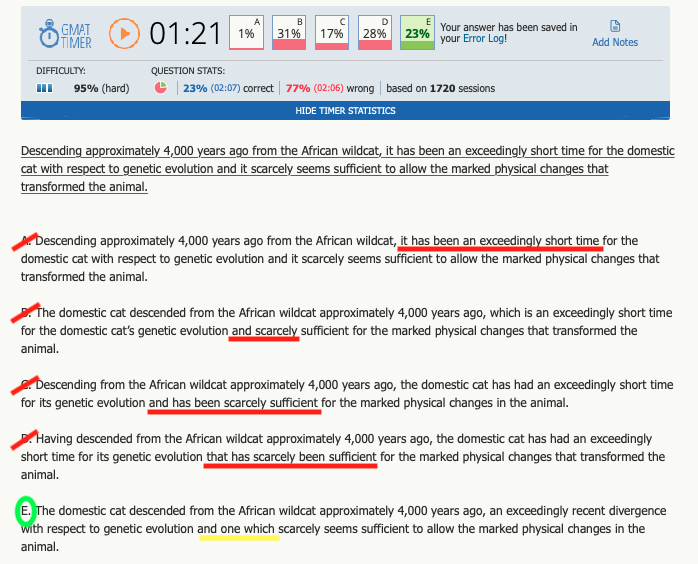kntombat wrote:
AndrewN, I would love to know your thoughts on this question.
I narrowed it down to B and E ,but chose B.
You asked for it,
kntombat, so here you go. As you can see in the image below, I chose (E) in 1:21 as
the least objectionable answer choice of the five presented. I will outline what guided my hand.
Attachment:
 Screen Shot 2021-07-04 at 12.05.42.png [ 127.72 KiB | Viewed 13305 times ]
Screen Shot 2021-07-04 at 12.05.42.png [ 127.72 KiB | Viewed 13305 times ]
Choice (A) fails because of a basic modifier error. Whatever follows the first comma should answer the question of what was
descending, and the placeholder
it does not deliver to that end. I even gave the sentence the benefit of the doubt and read on, just in case, but the reference to
time was a complete dealbreaker: time cannot have descended from a wildcat.
Choice (B) fails because
and scarcely places the two-word combination in a tight spot. When we hit
and without a comma, we expect to encounter a parallel entity. The first part of the relative clause,
which is, does
not carry over to the second as an understood element without a second
is. Why? Because, to put it plainly, there are too many words between the first and second entities, and it is hard to remember to apply the same stem to the second part. To be clear,
which is A and B can be fine, as long as "A" consists of a short description. For instance,
which is exceedingly short and scarcely sufficient would work fine on its own. But when the sentence pumps in a bunch of extra words and information as part of "A," we tend to forget the stem and need a reminder before we introduce "B." So, sandwich
is between the two words in question, and there would be no problem:
and is scarcely. Alternatively, we could remove
and to allow the
scarcely phrase to comment on the previous clause:
which is an exceedingly short time for..., scarcely sufficient for... Ultimately, we cannot negotiate what is on the screen, so even though (B) can be tempting, we cannot justify choosing it.
Choice (C) fails because the parallel marker
and should continue a description of the aforementioned
domestic cat:
the domestic cat has had [something] and has been [something]. It would make no sense to say that the domestic cat has been
scarcely sufficient in reference to time.
Choice (D) fails because the relative clause
that has scarcely been sufficient seems to be modifying
genetic evolution. How can evolution be just good enough to produce a transformation? Evolution, by definition, is change. It is neither a quantitative nor qualitative measure.
Choice (E) is the best answer of the five presented because even though
and one which needs to be scrutinized, it is not incorrect. The restrictive
which (instead of
that) is a nonissue, since GMAC™ has written in the
OG that this very split is
not tested. The
and should join two parallel entities, just as we considered in (B) earlier. So, what are those two entities? What, exactly, is
one standing in for? It must refer to
an exceedingly recent divergence, although perhaps in truncated form, as in
a divergence. Check for clarity:
an exceedingly recent divergence with respect to genetic evolution and [a divergence that] scarcely seems sufficient...That works. I might stylistically prefer to comment on the divergence by deleting
and and replacing it with a comma. Compare:
an exceedingly recent divergence with respect to genetic evolution, one [that] scarcely seems sufficient...However, once again, I am bound by what is on the screen. Like it or not, in the end, (E) wins out of this lot.
I hope that helps. Thank you for thinking to ask me about the question.
- Andrew



 95%
(hard)
95%
(hard)
 75%
(02:09)
wrong
75%
(02:09)
wrong  based on 2685
sessions
based on 2685
sessions



